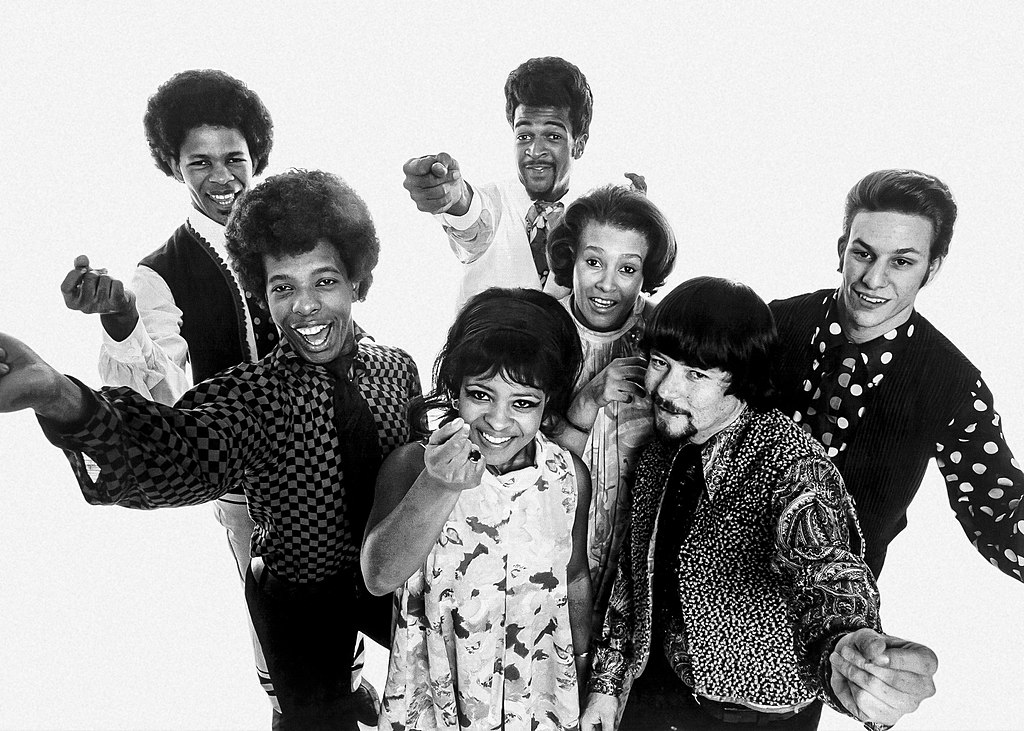Sly Stone’s early life and formation of his band
Sly Stone was born Sylvester Stewart in 1944 in Denton, Texas but was later raised, along with his siblings, in San Francisco Bay Area. At an early age he was seen as a prodigy at playing the keyboards. By the time he was 16, Stone had already been performing and scoring a regional hit with “Long Time Away.” He went on to study music while playing in several Bay Area groups. Stone also worked as a disc jockey at a few local radio stations there.
In 1966, he formed his own band called the Stoners, which featured Cynthia Robinson (trumpet). Around the same time his brother Freddie led his own act Freddie & the Stone Souls which consisted of himself, Greg Errico (drums) and Ronnie Crawford (saxophone). These two groups eventually merged. Another acquaintance Jerry Martini (saxophone) as well as Sly and Freddie’s sister Rosie (piano) joined the newly formed act which was named Sly and the Family Stone. Sly, Freddie and Rosie’s teenaged sister Vaetta Stewart and her friends Mary McCreary and Elva Mouton were then recruited by Sly himself to form a backing-vocals trio Little Sister.
First taste of commercial success
The racially-integrated group signed their first recording contract with Epic Records label in 1967. That same year they released their debut album A Whole New Thing, which stiffed. However, their second LP Dance to the Music (1968) finally made a dent on the charts, on the strength of the title track which went to the Top 10 of both pop and R&B singles charts, at #8 and #9 respectively. The Family Stone’s third album Life (1968) had a so-so performance, but the follow-upStand! (1969) tremendously resurrected the group’s fortunes.
Stand! truly became Sly and the Family Stone’s first genuine hit album. It featured the title track, which topped both the R&B and pop charts and spent over a hundred weeks there. Besides being musically compelling, Stand! is also artistically striking, with its strong political and social message. The album even originated the now-all-too-familiar phrase “different strokes for different folks.”Stand! featured the title track (#22 pop, #14 R&B) and the #1 pop/R&B hit “Everyday People” which attacked racism (through its popular line “don’t call me nigga, whitey”).
Continuing chart successes
Sly and the Family Stone continued their successes with subsequent hits “Hot Fun In The Summertime” (#2 pop, #3 R&B, 1969), “Thank You (Falettinme Be Mice Elf Again)” b/w “Everybody Is A Star” (#1 pop, #1 R&B, 1970), “Family Affair” (#1 pop, #1 R&B, 1971), “Runnin’ Away” (#23 pop, #15 R&B, 1972), and “If You Want Me To Stay” (#12 pop, #3 R&B, 1973).
The band also had released their Greatest Hits album (#2 pop, #1 R&B) andThere’s a Riot Goin’ On, which was the Family Stone’s only #1 pop album (it also reached #1 on the R&B album charts).
Sly Stone’s later career
Behind the success and popularity the band was achieving, there lurked troubles that would eventually surface in the open. Sly Stone’s substance abuse as well as the band’s erratic and very often late attendance to their gigs had lost them several of their live bookings. By 1972, the group experienced a shift in their personnel, but it did nothing to save them from the crisis they were in.
Another thing that contributed to the group’s detriment was the rise of disco, replacing funk as the “hot” genre during that period. Sly’s personal struggles continued in its downward spiral. The Family Stone released their final studio album Heard Ya Missed Me, Well I’m Back in 1976, and their relationship with Epic had come to an end in 1979. That same year Sly and the Family Stone signed a new contract with Warner Bros. label and recorded Back on the Right Track. However, they were never able to regain their prior fame and success.
Around this period Sly Stone toured with George Clinton and Funkadelic. Stone eventually appeared on the 1981 Funkadelic album The Electric Spanking of War Babies. He continued to work and toured with Clinton and his P-Funk All-Stars and also collaborated with Bobby Womack. In 1982, Sly and the Family Stone released their tenth and final album Ain’t But the One Way which was largely ignored.
Stone never quite regained his earlier success. He continues to battle with his addiction up to this day while occasionally popping out in several gigs and music festivals.
The band’s original lineup did a tribute performance at the 2006 Grammy Awards, which was marked by Stones’ unusually brief appearance. Sly and the Family Stone’s rather bizarre Grammy tribute number got the critics’ mixed reactions, from the favorable to the scathing.
Sly and the Family Stone’s inestimable contributions had also led them to be inducted into the Rock and Roll Hall of Fame in 1993.

